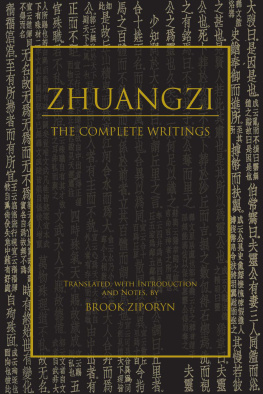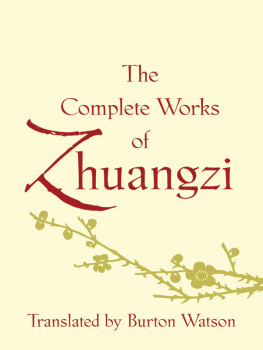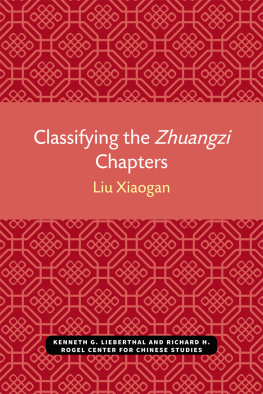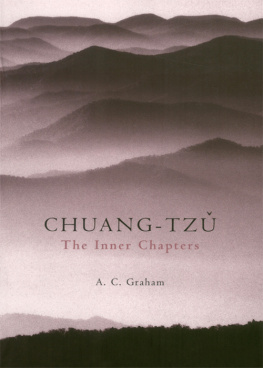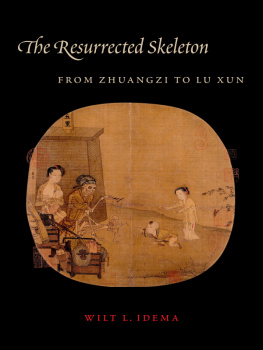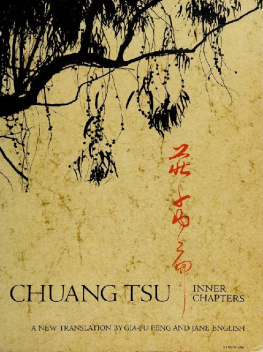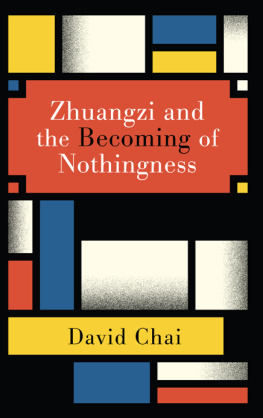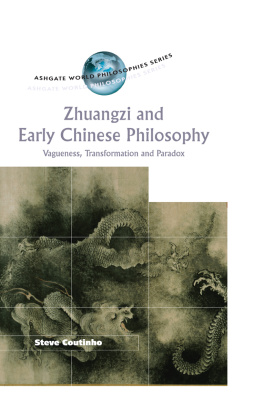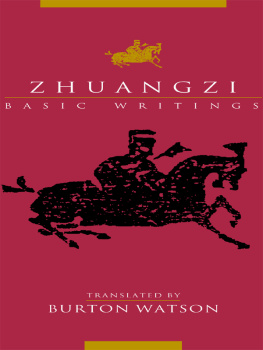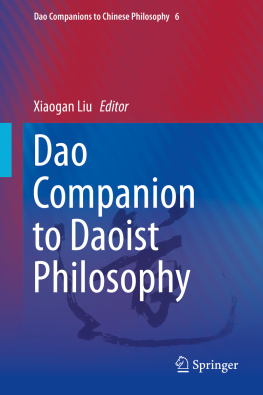Zhuangzi - Zhuangzi: The Complete Writings
Here you can read online Zhuangzi - Zhuangzi: The Complete Writings full text of the book (entire story) in english for free. Download pdf and epub, get meaning, cover and reviews about this ebook. year: 2020, publisher: Hackett Publishing Company, Inc., genre: Religion. Description of the work, (preface) as well as reviews are available. Best literature library LitArk.com created for fans of good reading and offers a wide selection of genres:
Romance novel
Science fiction
Adventure
Detective
Science
History
Home and family
Prose
Art
Politics
Computer
Non-fiction
Religion
Business
Children
Humor
Choose a favorite category and find really read worthwhile books. Enjoy immersion in the world of imagination, feel the emotions of the characters or learn something new for yourself, make an fascinating discovery.
- Book:Zhuangzi: The Complete Writings
- Author:
- Publisher:Hackett Publishing Company, Inc.
- Genre:
- Year:2020
- Rating:4 / 5
- Favourites:Add to favourites
- Your mark:
- 80
- 1
- 2
- 3
- 4
- 5
Zhuangzi: The Complete Writings: summary, description and annotation
We offer to read an annotation, description, summary or preface (depends on what the author of the book "Zhuangzi: The Complete Writings" wrote himself). If you haven't found the necessary information about the book — write in the comments, we will try to find it.
Zhuangzi: author's other books
Who wrote Zhuangzi: The Complete Writings? Find out the surname, the name of the author of the book and a list of all author's works by series.
Zhuangzi: The Complete Writings — read online for free the complete book (whole text) full work
Below is the text of the book, divided by pages. System saving the place of the last page read, allows you to conveniently read the book "Zhuangzi: The Complete Writings" online for free, without having to search again every time where you left off. Put a bookmark, and you can go to the page where you finished reading at any time.
Font size:
Interval:
Bookmark:

Translated, with Introduction and Notes, by
BROOK ZIPORYN
Hackett Publishing Company, Inc.
Indianapolis/Cambridge
Copyright 2020 by Hackett Publishing Company, Inc.
All rights reserved
Printed in the United States of America
23 22 21 20 1 2 3 4 5 6 7
For further information, please address
Hackett Publishing Company, Inc.
P.O. Box 44937
Indianapolis, Indiana 46244-0937
www.hackettpublishing.com
Cover design by Deborah Wilkes and E.L. Wilson
Composition by Integrated Composition Systems
Library of Congress Control Number: 2019952373
ePub3 ISBN: 978-1-62466-927-9
Zhuangzi, The Essential Writings, with Selections from Traditional Commentaries. Translated, with Introduction, by Brook Ziporyn.
Confucius, Analects, with Selections from Traditional Commentaries. Translated by Edward Slingerland.
Mengzi, Mengzi, with Selections from Traditional Commentaries. Translated, with Introduction, by Bryan W. Van Norden.
Laozi, The Daodejing of Laozi. Translated, with Commentary, by Philip J. Ivanhoe.
Readings in Classical Chinese Philosophy, Second Edition. Edited by Philip J. Ivanhoe and Bryan W. Van Norden.
This volume includes a complete translation of the thirty-three chapters of the Chinese text, Zhuangzi, a substantial portion of which I had previously translated and published in 2009 as the main text of a volume titled Zhuangzi: The Essential Writings with Selections from Traditional Commentaries (Hackett, 2009). In the course of my normal duties in the decade or so since, I have had many opportunities to further study and teach the Zhuangzi, reading through and discussing my translation and interpretation of this work with a great many very intelligent and attentive students and scholars. In these same ten years since the publication of the abridged Zhuangzi, the digital tools available for research into classical Chinese texts, which played little to no role in my translation process during the aughts, have become exponentially more powerful, allowing for instant comparison of huge quantities of texts and contexts, which would have taken months and years only a short time ago. In the course of these highly enjoyable labors, with these amazing new resources, going over and over both the source text and my own translation many dozens of times and hashing it out with so many brilliant students and colleagues, I have sometimes felt I had made important new discoveries about how to interpret particular passages and how to approach various structural and philosophical issues, sometimes in the form of major insights, sometimes just as a further nuancing of prior hunches or through a more felicitous English word choice that had not previously come to mind. The ripening of these things can take quite a bit of time, it seems. Hence, in addition to providing translations of all portions of the text that are omitted from the 2009 book, I have also made some substantial changes to the translations of the chapters previously translated there. Where the present and previous translations diverge, I am happy to have both versions available to readers. In all cases, both choices have something to recommend them, although obviously as of this moment in time I regard the versions in this volume to be preferable, albeit sometimes only marginally so.
The selections from traditional commentaries in the earlier volume have been omitted in this one; the reader is invited to consult them there if interested. But I have amplified considerably the explanatory material included in the footnotes (marked 1, 2, 3, etc.), which provide important information to aid the real-time reading of the text, and have also added endnotes (marked A, B, C, etc.) when a technical philological matter must be addressed or a more extended conceptual {viii} discussion is warranted. This, too, was a result of repeatedly working through the text with knowledgeable and insightful interlocutors, in the course of which I was sometimes surprised by queries about some of the technicalities of the translation choices or about the implicit interpretative stance behind them. This made it incumbent upon me to explain in detail the contextual and philosophical considerations that informed my decisions as well as the relevant grammatical constructions, parsings, and textual precedents in the source language and the relevant rhetorical implications or ghost allusions in the target language. I had often found such questions unexpected, not because I had any illusions that all my choices were obviously right, but because I expected that all who would be in a position to wonder about themproficient readers of classical Chinesewould also be able to reconstruct the reasoning behind them at a glance, tracking which among the many ambiguous possibilities presented by the text had been followed. The astute questionings I have received from my colleagues have disabused me of that assumption and have had the great value of forcing me to ponder these decisions closely and to communicate their justifications. The ensuing conversations often led to deeper ponderings of the many factors contributing to each decision, sometimes also leading me to reconsider them, but in every case giving me a more intricate grasp of the complexity of the text and the need for detailed explanations. The footnotes and endnotes in this volume provide such readers with at least the bare outline of the reasoning and evidence behind controversial translation choices in the hopes that even if they remain unconvinced, they will at least have the evidence laid out before them. This volume also includes a Glossary, which is a considerably expanded and revised version of the Glossary that appears in the 2009 abridgment.
My views concerning the historical and philosophical background of this text as stated in the Introduction to the 2009 volume, partially reprinted below, have not significantly changed in the intervening decade. I deliberately did not provide a specific interpretation of the Zhuangzis philosophical or religious thought and its significance in the print version of that volume, although obviously my own interpretive perspective was embedded in my translation in thousands of places, because I hoped the text should nonetheless be given the maximal possible opportunity to speak for itself to new readers, without poisoning the wells in advance with my own sometimes fervent views on its meanings to any greater degree than would be inevitable as a consequence of already pulling the interpretive strings in every sentence of the translation. Among scholars of ancient Chinese, after all, interpretations of Zhuangzi are like, er, belly buttonseveryone has oneand I hoped to make the translation as user-friendly as possible to whomever might want to use it in whatever way they saw fit. I did provide my own interpretation of the philosophical position that in my view best explains the text of the Inner Chapters (17) if and when they happen to be considered as a single unit, in an online essay linked to the earlier edition, Zhuangzi as Philosopher (https://www.hackettpublishing.com/zhuangziphil). My views on that topic have not substantially changed, although they have developed and ramified further in the same direction, toward greater precision and detail and into a more fully {ix} elaborated explication of the premises and implications of Zhuangist thinking, to which I attach considerable philosophical importance. But in that essay I did not attempt to give an interpretation of any of the remaining twenty-six chapters of the book, or any subset of them considered as a single coherent text, nor indeed of the thirty-three-chapter
Font size:
Interval:
Bookmark:
Similar books «Zhuangzi: The Complete Writings»
Look at similar books to Zhuangzi: The Complete Writings. We have selected literature similar in name and meaning in the hope of providing readers with more options to find new, interesting, not yet read works.
Discussion, reviews of the book Zhuangzi: The Complete Writings and just readers' own opinions. Leave your comments, write what you think about the work, its meaning or the main characters. Specify what exactly you liked and what you didn't like, and why you think so.

